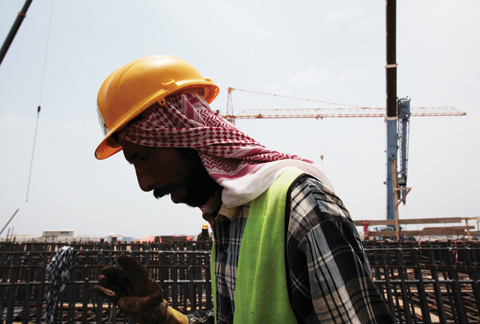RIYADH: Saudi Arabia will cut ministers' salaries by 20 percent and scale back financial perks for public sector employees, according to a cabinet statement and royal decree broadcast on state-run Ekhbariya TV yesterday. It was the first announcement of pay cuts for government employees, who make up about two-thirds of working Saudis. "The cabinet has decided to stop and cancel some bonuses and financial benefits," read a line of text on Ekhbariya, as a minister read to assembled ministers and royals, including King Salman, a list of cuts in various grades in the civil service.
The decision comes as low oil prices have pushed energy-rich Gulf Arab states to rein in lavish public spending. The kingdom racked up a record budget deficit of $100 billion last year, forcing it to find new savings and ways to raise money. A royal decree read directly after the broadcast on the TV channel announced the cut in ministers' pay, among them the king's successors: Crown Prince and Interior Minister Mohammed bin Nayef, and Deputy Crown Prince and Defense Minister Mohammed bin Salman. Housing and car allowances for members of the appointed Shura Council will be cut by 15 percent. Overtime bonuses were curbed at between 25 and 50 percent of basic salaries, while annual leave may no longer exceed 30 days.
An exception to the curbs would be made for troops involved in combat operations along the southern border and abroad as part of an 18-month military intervention led by the kingdom in neighboring Yemen. Saudi Arabia unveiled an economic reform plan this year to wean the kingdom off its addiction to oil, on which it depends for the overwhelming share of government revenue. The "Vision 2030" initiative aims to jumpstart the private sector, provide jobs for a growing population and collect more non-oil revenue.
"It's one more economic measure to balance spending. Of course people don't like it, but it's a sign of the times," Saudi analyst and editor of Arab News Jamal Khashoggi said. "Probably the teachers and many others will be affected by it. It shows why it's important for the private sector and Saudi GDP to diversify," he told Reuters. Saudi Twitters users responded to the announcement with dismay. One Twitter user, Rayan Al-Shamri, said the move boded ill for the future: "God be with the citizens, we are back to the time of poverty."
The cuts to public sector perks, effective Oct 1, are the stiffest in a series of recent measures to boost revenue. Last month the cabinet approved proposals to raise a range of government fees including visa charges and fines for some traffic violations such as "drifting," or the reckless skidding of cars at high speed - a pastime for some Saudi youth. It cut subsidies for power and water last December, then sacked the minister responsible following a public outcry over how the new water tariffs were applied.
Separately, hundreds of Pakistani construction workers are to fly home from Saudi Arabia this week but without the salaries they have waited months to receive, embassy officials told AFP. A total of 405 Pakistanis owed wages by once-mighty Saudi Oger will fly home from tomorrow courtesy of the Saudi government, said Abdul Shakoor Shaikh, the Pakistani embassy's community welfare attache. They are among more than 6,500 Pakistanis who, he said, have not been paid by the construction giant for that past eight or nine months.
Large contingents of Filipinos and Indians have also gone months without pay from Saudi Oger, which is led by Lebanon's billionaire former premier Saad Hariri. In all, more than 30,000 Saudi Oger workers are affected. Employees of Oger and other construction companies, which are dependent on state contracts, have suffered because of delayed receipts from a Saudi government whose oil revenues have collapsed over the past two years.
Shaikh said 275 Pakistanis have already flown home under an aid plan announced last month by King Salman. The 100-million-riyal ($27-million) fund helps stranded workers with food, medical needs, a trip home, exit visas or, if they want, transfer to another employer in Saudi Arabia. Shaikh said the Saudi labor ministry "has facilitated a lot" in caring for the workers and has also helped to file court claims against Saudi Oger.
The embassy is authorized to receive the back wages for most of the workers and, when it arrives, will forward the money to those who return home, officials at the mission said. "But the problem persists. We cannot say that Saudi Oger has started paying the salaries," Shaikh said. Exit visas for more than 2,000 of the Pakistanis have been completed, and the rest must decide whether to also go home.
A relatively small number, more than 70, have transferred to other companies in Saudi Arabia but Shaikh said other sectors do not pay as much as construction. Shaikh was confident the workers would eventually receive their delayed wages. "The judicial system is good compared to other countries," he said. In May, Saudi Binladin Group, another construction titan, began paying delayed wages to its remaining staff after laying off tens of thousands of employees. - Agencies










